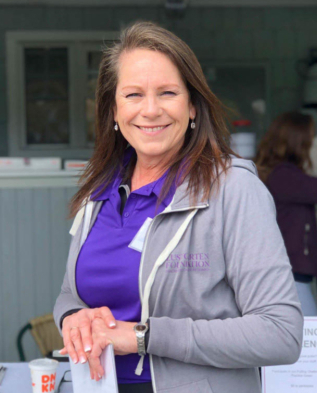Giving the Gift of Life
Topic: Announcement, Hide on Homepage, Real Talk: Survivor, Patient & Family Stories, Your Source for Breaking News & Inspirational Stories

Rosemary Grabowski
July 17, 2014 is seared into my memory as the day my world fell apart; it was the day my beloved husband and best friend, Rich, was diagnosed with pancreatic cancer.
In 2014, when Rich was 56 and otherwise healthy, he started experiencing digestive issues and noticed the whites of his eyes looked a bit yellow. He immediately went to his doctor, who recommended a CT scan. A mass was detected, and the doctor promptly performed a biopsy. I’ll never forget that surreal moment when the doctor came out of the operating room and told us the news that Rich had a mass on his pancreas which was likely Stage 4 pancreatic cancer. It was hard to process what we were just told, but one thing was sure—we were devastated.
At the time, three of our children were away at college and one was home in high school. We asked the kids to come home, and as a close-knit family, we honestly and openly discussed the disease and Rich’s prognosis. We told them we’d be going on this tumultuous journey together. For the first few months, Rich wanted to keep this news private at a moment when the rest of us felt like we needed to confide in others. And, while it was incredibly difficult to not discuss, we abided by his wishes because we knew deciding when to tell loved ones about his illness made him feel more in control.
Rich underwent extensive chemotherapy with the hope of shrinking the tumor enough to operate. Despite being treated at a renowned cancer center, he also contacted other leading cancer centers across the country to see if anyone would take on his case and operate, knowing that this was his best chance for survival. Unfortunately, all of the surgeons agreed that his cancer was too widespread to perform a safe and successful surgery. Despite this massive setback, he maintained a positive attitude, and fought incredibly hard to seek out clinical trials, and to have more time with his family.
In the face of overwhelming odds, Rich coped by living his life to the fullest and continuing to be the charismatic, entertaining, genuine, and warm-hearted person so many people knew and loved. He quit his job, and we traveled extensively from January through October 2015, working our plans around his chemotherapy schedule. We created some of our most cherished memories, traveling to Madrid, Vermont, California, Italy, Disney World (twice), New York City and Cape Cod to spend time with close friends. In October, we went to wine country in France together, but by early November, the chemotherapy stopped working and there were no other viable treatment options. It was heartbreaking to get hospice care for him. In a role reversal, he was actually the one comforting his loved ones, letting us know he had made peace with what was happening to him and making sure our family was well taken care of. That’s just the kind of husband, father, and friend that Rich was.
Watching a loved one suffer with pancreatic cancer taught me how important it is to have a supportive, embracing network. I encourage others in this horrible situation to give the gift of comfort to family, friends, and others who love you by accepting assistance from them. It helps your loved ones to cope when they too feel powerless and want to do something—anything. I also encourage family members impacted by this devastating disease to seek out resources to have a better understanding of pancreatic cancer, including a professional who can connect you with clinical trials. The Lustgarten Foundation is a valuable resource for this information and support and offers a clinical trial finder to help identify potential trials.
I learned about the Lustgarten Foundation when a friend started donating through work after Rich got sick. I was (and continue to be) so impressed that 100% of every donation funds pancreatic cancer research. I wanted to help raise money for research as a way to honor Rich’s legacy. In fact, no cause has ever been so urgent or motivated me to fundraise as much as this one has.
The Lustgarten Foundation’s mission also resonated with my family, and we wanted to create an event representing Rich’s love for bringing people together, his passion for golf, and our desire to help others fighting this unforgiving disease. We’ve organized and hosted five Richard W. Grabowski Memorial Golf Fundraisers so far, and we’re proud to say that we have raised $112,000 to date! Usually, 120-180 people attend the annual event at Whitney Farms Golf Course in Connecticut, and it becomes a massive reunion of family and friends and a celebration of Rich’s life, with lots of laughter, stories, and an endless supply of beautiful memories.
Even though there were no effective treatments or cures for Rich, I’m forever grateful to anyone who donates to pancreatic cancer research. It’s such a devastating diagnosis, and the survival rate is awful, and by donating—giving the gift of research—people are also giving the gift of life. The Lustgarten Foundation is on the cusp of so many innovations to address this disease through an early detection blood test, organoids, new treatments, and even a potential vaccine. In memory of Rich, we need everything people can give to ensure these breakthroughs are possible and patients and their families have more time to create more memories together.

